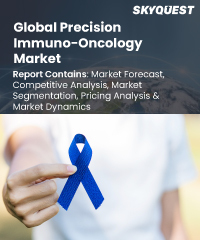
Report ID: SQMIG35H2063

Report ID:
SQMIG35H2063 |
Region:
Global |
Published Date: July, 2024
Pages:
157
|
Tables:
121 |
Figures:
77
Precision Immuno-Oncology Market size was valued at USD 54.74 billion in 2022 and is poised to grow from USD 60.65 billion in 2023 to USD 137.77 billion by 2031, growing at a CAGR of 10.80% in the forecast period (2024-2031).
Precision immuno-oncology is becoming popular since It allows for a personalized treatment approach based on patients, genetic makeup, tumor characteristics and immune system. This approach can reduce side effects compared to traditional cancer treatments and improve outcomes.
The various advantages of precision immuno-oncology are personalized treatment, increased efficacy, reduced toxicity, potential for long term remissions, and growing market. Precision immuno-oncology is a relatively new field of cancer treatment that aims to provide personalized care to patients based on their genetic makeup, tumor characteristics, and immune system. This approach involves using advanced diagnostic tools to identify specific genetic mutations and proteins expressed by cancer cells, which can then be targeted with precision therapies. By tailoring treatments to the individual patient, precision immuno-oncology has the potential to improve treatment outcomes and reduce side effects compared to traditional cancer treatments that are not personalized. The personalized treatment approach of precision immuno-oncology is a major advantage of this emerging field. This approach allows for a more precise and targeted therapy that can address the unique genetic and immunological factors that contribute to a patient's cancer. By understanding the specific molecular profile of the patient's tumor, physicians can develop a customized treatment plan that is more likely to be effective and less likely to cause harmful side effects. It has shown promise in several clinical trials, where patients with advanced cancers that were previously resistant to treatment have experienced remarkable responses to precision immuno-oncology therapies. In addition, because these therapies are highly specific, they can spare healthy tissues from unnecessary damage, leading to a better quality of life for patients. The market is a rapidly expanding sector within the pharmaceutical industry, with an increasing number of companies investing in research and development of these treatments.
This trend reflects the growing recognition of the potential of precision immuno-oncology to revolutionize cancer treatment. As more research is conducted and more success stories emerge, there is a growing awareness of the potential impact of precision immuno-oncology on cancer treatment. This has led to a surge of interest and investment from pharmaceutical companies, who see the potential of this field to provide more effective and personalized treatments to patients.
US Precision Immuno-Oncology Market is poised to grow at a sustainable CAGR for the next forecast year.
Our industry expert will work with you to provide you with customized data in a short amount of time.
REQUEST FREE CUSTOMIZATIONWant to customize this report? This report can be personalized according to your needs. Our analysts and industry experts will work directly with you to understand your requirements and provide you with customized data in a short amount of time. We offer $1000 worth of FREE customization at the time of purchase.

Report ID: SQMIG35H2063